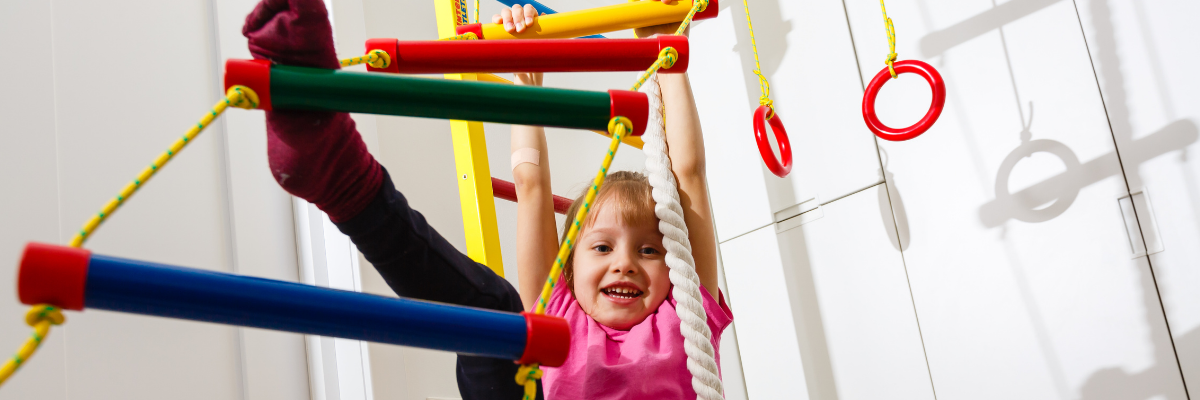Is your child picky about clothing? It is common for children to have a favorite shirt, blanket, or pants, but what if they refuse to wear anything besides their one outfit of choice? In the pediatric world of occupational therapy, we often work with children who cannot tolerate wearing various clothing items. We have seen the stress of dressing tasks for children and their caregivers. The intended purpose of this blog is to educate parents on why a child may be sensitive to clothing and point caregivers in the right direction to address these concerns.
Why is My Child Picky About Their Clothing?
Every child processes sensory information differently. Children who demonstrate intolerance to various clothing textures may often have sensory sensitivities to tactile (touch) information, also known as tactile defensiveness. This indicates that the neurons responsible for processing tactile information have lower neurological thresholds, meaning more sensory information reaches their brain quicker, which can cause children to become overwhelmed by the stimulus. This results in heightened responses (ex., Crying, screaming, itching) when a child is prompted to wear clothing that feels uncomfortable to them. Another underlying reason for tactile sensitivities can be connected to retained primitive reflexes. Retained primitive reflexes often contribute to a child’s hypersensitivity to general sensory information and can make clothing items with tags or tight waistbands challenging to wear.
When Should I Be Concerned About My Child’s Intolerance for Clothing?
It can be hard to discern when a child’s intolerance to clothing is a behavioral or sensory concern. A child who doesn’t “like” to wear a particular clothing item or texture is very different from a child who physically cannot tolerate certain textures. True sensory concerns will present with consistent behaviors across settings. For example, a child with true tactile defensiveness will have difficulty wearing a non-preferred clothing item at home or daycare. Additionally, consulting a professional is not customarily warranted if their limited clothing items do not impact a child’s performance and participation in meaningful activities. However, if a child’s clothing sensitivities are impacting their meaningful activities, then it may be beneficial to talk with a pediatric occupational therapist to determine what options or strategies are appropriate. An example could be a child who wants to play soccer but cannot tolerate wearing soccer cleats or sneakers and, therefore, refuses to play. Another example would be a child or adolescent who refuses to wear clothing to match the temperature outside, such as refusing to wear gloves or mittens in the middle of winter.
Strategies to Expand A Child’s Wardrobe
- Keep a diary/log:
- Children will normally demonstrate a pattern of behaviors to show caregivers what types of clothing are uncomfortable. It will be essential to keep a log of what items/fabrics are preferred to limit the child’s discomfort when presented with new clothing items to try on.
- Present sensory-friendly clothing:
- There are common characteristics of clothing that can be aversive to children with tactile defensiveness. For these reasons, we have provided a list of clothing items that are often more tolerable for sensory-sensitive children:
- Clothing without seams
- Clothing without tags
- Loose fitting clothing
- Soft/smooth fabric
- Breathable clothing: avoid clothing that holds moisture
- There are common characteristics of clothing that can be aversive to children with tactile defensiveness. For these reasons, we have provided a list of clothing items that are often more tolerable for sensory-sensitive children:
- Invite them into the process:
- Providing the child with autonomy in choosing their clothing will help remove feelings of stress that surround dressing activities. One way to do this is to take them shopping and ask them what clothing they want. Depending on the child’s comfort level, it can also be beneficial to have them choose a variety of clothing to try on and have a “fashion show” in the dressing room.
What Other Concerns Can arise with Children Being Picky About Clothing, and How Can Carolina Therapy Connection Help?
Tactile defensiveness does not only impact a child’s ability to tolerate various clothing items. Typical areas of difficulty for tactilely defensive children include, but are not limited to, difficulty with hair brushing/washing, hair cuts, tooth brushing, nail clipping, and bathing. If your child has difficulty tolerating any of the above activities, then it may be beneficial to meet with a pediatric occupational therapist to discuss the best care plan for the child. Call our clinic at (252) 341-9944! Your child may benefit from an occupational therapy screening or formal evaluation!
By: Emily Britt





















